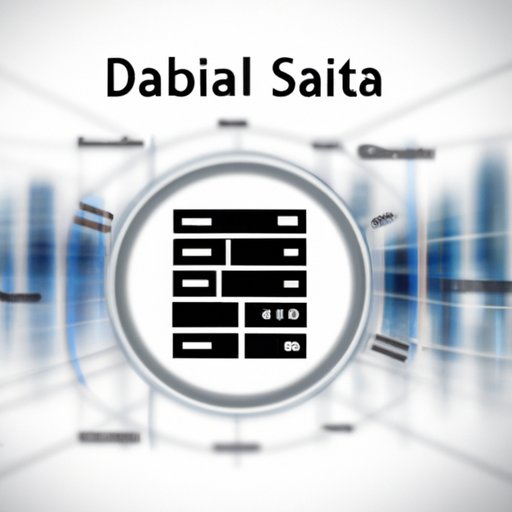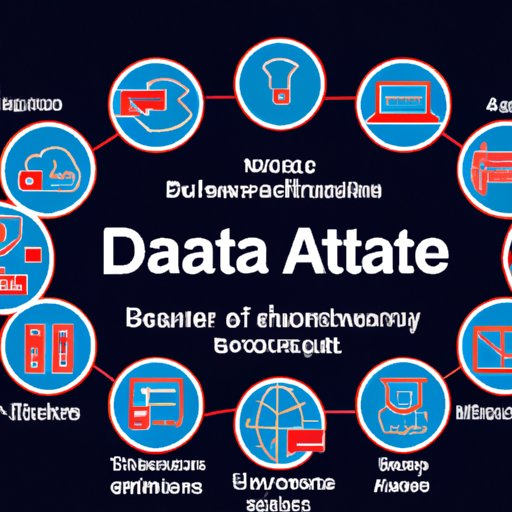Introduction
Database technology is an ever-evolving field of computer science that has revolutionized how information is stored and accessed. From large enterprises to small businesses, databases are used to store and manage data more efficiently and securely. This article will explore what database technology is, the benefits it offers, and how it can be used in various applications.

Exploring the Basics of Database Technology
At its core, database technology is a system for storing and organizing data. It consists of a collection of tables, files, or other structures that are organized in a way that makes it easy to access, update, and analyze the data. A database can be used to store anything from customer orders to medical records.
The most common type of database is a relational database, which stores data in a series of related tables. The tables in a relational database are linked together using primary and foreign keys, which allow them to be connected and easily queried. Other types of databases include non-relational databases, cloud databases, in-memory databases, and graph databases. Each type has its own set of benefits and drawbacks, so it’s important to choose the right one for your particular application.
In addition to the different types of databases, there are many benefits to using a database. By using a database, businesses can improve their efficiency, accuracy, and productivity. Data can be stored more securely, and queries can be run quickly and easily. Databases can also be used to generate reports and analytics, giving businesses valuable insights into their operations.
The Benefits of Database Technology for Businesses
Businesses of all sizes have recognized the value of database technology and have begun to implement it in their operations. Here are some of the key benefits of using a database for business:
Improved Efficiency: By using a database, businesses can save time and resources by streamlining processes and automating tasks. With a database, data can be accessed quickly and accurately, allowing businesses to make decisions faster and more efficiently.
Accurate Data Storage: Databases provide a secure and reliable way to store data. With a database, businesses can rest assured that their data is accurate and up-to-date. Databases can also be backed up regularly, ensuring that data is not lost in the event of a disaster.
Increased Productivity: By using a database, businesses can increase their productivity by eliminating manual processes and reducing repetitive tasks. With automated processes and real-time data access, businesses can focus on more important tasks and better serve their customers.
Understanding Database Types and Their Uses
As mentioned above, there are several different types of databases available. Each type has its own set of features and benefits, and it’s important to understand the differences between them in order to choose the right one for your needs. Here is a brief overview of the most common types of databases and their uses:
Relational Databases: Relational databases are the most commonly used type of database. They store data in a series of related tables and allow users to query the data with SQL commands. Relational databases are ideal for structured data and are used in a wide range of applications, from retail management systems to customer relationship management (CRM) systems.
Non-Relational Databases: Non-relational databases are a newer type of database that is designed for unstructured data. Unlike relational databases, non-relational databases do not use tables and instead store data in a “document” format. Non-relational databases are often used for web applications, such as content management systems and ecommerce platforms.
Cloud Databases: Cloud databases are databases that are hosted on cloud computing platforms, such as Amazon Web Services or Microsoft Azure. Cloud databases are highly scalable and offer a number of benefits, such as increased availability and reduced maintenance costs. They are often used for large-scale projects or applications that require high levels of performance.
In-Memory Databases: In-memory databases are databases that store data in RAM instead of on disk. This allows for fast access and processing of data, making them ideal for applications that require real-time analysis. In-memory databases are often used for financial and scientific applications.

How Database Technology Enhances Data Security
In addition to the benefits mentioned above, database technology can also be used to improve data security. By using a database, businesses can protect their data from unauthorized access and ensure that it remains safe and secure. Here are some of the ways that databases can enhance data security:
Data Encryption: Databases can be used to encrypt data, making it nearly impossible for unauthorized users to access it. Encryption ensures that only authorized users can view the data, helping to prevent data breaches and other security incidents.
Access Control: Databases can also be used to control who has access to the data. Access control measures ensure that only authorized users can view, add, modify, or delete data. This helps to reduce the risk of unauthorized access and improves overall data security.
Backups and Redundancy: Databases can be configured to automatically create backups of data. This ensures that data is not lost in the event of a disaster, and it also provides redundancy in case of hardware failures or other issues.
Keeping Up with the Latest in Database Technology
The field of database technology is constantly evolving, and it’s important for businesses to stay up-to-date on the latest advancements. Here are some of the newest trends in database technology:
Automation and AI: Automation and artificial intelligence (AI) are being used to automate routine tasks and improve the accuracy and speed of data analysis. By leveraging these technologies, businesses can save time and resources while gaining valuable insights into their operations.
Big Data Analytics: Big data analytics is being used to gain insights from large datasets. By analyzing this data, businesses can identify patterns and trends that can help them make more informed decisions.
Blockchain Technology: Blockchain technology is being used to securely store and transfer data. By using blockchain, businesses can ensure that their data is safe and secure while also providing transparency and accountability.

The Impact of Database Technology on Modern Society
The use of database technology has had a profound impact on modern society. By making data accessible, secure, and easier to manage, databases have enabled businesses to make better decisions and provide better services. Here are some of the ways that database technology has impacted modern society:
Better Decision Making: By providing access to accurate and up-to-date data, databases have enabled businesses to make more informed decisions. This has helped to improve the quality of products and services and has allowed businesses to operate more efficiently.
Improved Communication: Databases have enabled businesses to communicate more effectively with their customers and partners. By using a database, businesses can store customer information and use it to send targeted messages and promotions.
More Efficient Services: Databases have made it possible for businesses to provide more efficient services. By automating processes and streamlining operations, businesses can provide better service to their customers while saving time and resources.
Conclusion
Database technology is an essential tool for managing and storing data. It provides businesses with improved efficiency, accuracy, and security, and has had a significant impact on modern society. By understanding the different types of databases and their uses, businesses can choose the right one for their needs and take advantage of the many benefits that database technology has to offer.
(Note: Is this article not meeting your expectations? Do you have knowledge or insights to share? Unlock new opportunities and expand your reach by joining our authors team. Click Registration to join us and share your expertise with our readers.)
